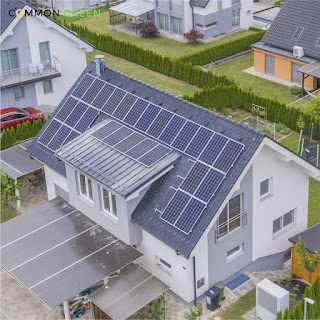The Advantages of Solar Energy in the Renewable Power Landscape
In
the quest for a sustainable future, the sun emerges as a formidable ally,
offering a vast and virtually limitless source of renewable energy. Solar
power, derived from the radiant light and heat of the sun, has gained
significant traction in recent years as a clean and efficient alternative to
fossil fuels. Its benefits extend far beyond mere environmental considerations,
encompassing economic, social, and even geopolitical advantages.
Let's delve into the myriad reasons why solar energy stands
as a beacon of hope in our transition towards a greener, more sustainable
world. At its core, solar energy embodies the essence of sustainability. Unlike
finite fossil fuels such as coal and oil, the sun radiates an abundance of
energy every day, free of charge.
By harnessing this boundless resource, we can drastically
reduce our reliance on non-renewable sources, mitigating the environmental
damage caused by their extraction and combustion. Moreover, solar power
generation produces virtually no greenhouse gas emissions, making it a crucial
player in the fight against climate change.
With rising concerns over air pollution and global warming,
the imperative to adopt clean energy solutions has never been clearer, and
solar offers a compelling answer. One of the most compelling aspects of solar
energy lies in its versatility and accessibility. Solar panels can be deployed
on a variety of scales, from individual households to vast solar farms spanning
acres of land. This decentralized nature democratizes energy production,
empowering communities to take control of their power generation and reduce
their reliance on centralized grids. In remote or off-grid areas, solar
installations offer a lifeline, providing electricity where traditional
infrastructure is lacking. This not only improves quality of life but also
fosters economic development and resilience in the face of natural disasters or
other disruptions.
Furthermore, the economics of solar energy have become
increasingly favorable, thanks to technological advancements and falling costs.
The price of solar panels has plummeted in recent years, making solar power
competitive with, and in many cases cheaper than, conventional energy sources
in numerous regions around the globe. This trend is further bolstered by the scalability
of solar installations, which can be tailored to suit the needs and budgets of
diverse consumers.
As solar becomes more affordable and accessible, its
potential to drive widespread adoption and facilitate the transition to a
renewable energy future becomes all the more tangible. In parallel with the
rise of solar energy, the concept of "Common Green Solar" has emerged
as a guiding principle in sustainable development. Common Green Solar
encapsulates the idea that environmental stewardship is a shared responsibility,
transcending national boundaries and individual interests. It emphasizes the
importance of collaboration, innovation, and equitable distribution of
resources to address global environmental challenges effectively. Solar energy
epitomizes the spirit of Common Green Solar by offering a universally
accessible solution to energy poverty and environmental degradation. Moreover,
the proliferation of solar power contributes to a more resilient and
interconnected global energy landscape. By diversifying energy sources and
reducing dependence on fossil fuels, solar energy enhances energy security and
geopolitical stability. It diminishes the stranglehold of energy monopolies and
empowers nations to chart their own course towards sustainability. In this
sense, solar energy serves as a catalyst for cooperation and diplomacy,
fostering a shared commitment to safeguarding our planet for future
generations. In conclusion, solar energy represents a beacon of hope in our
collective quest for a sustainable future. Its abundance, affordability, and
environmental benefits make it a cornerstone of the renewable energy
revolution. By embracing solar power and embracing the principles of Common
Green Solar, we can pave the way towards a cleaner, more resilient world for
ourselves and generations to come.



Comments
Post a Comment